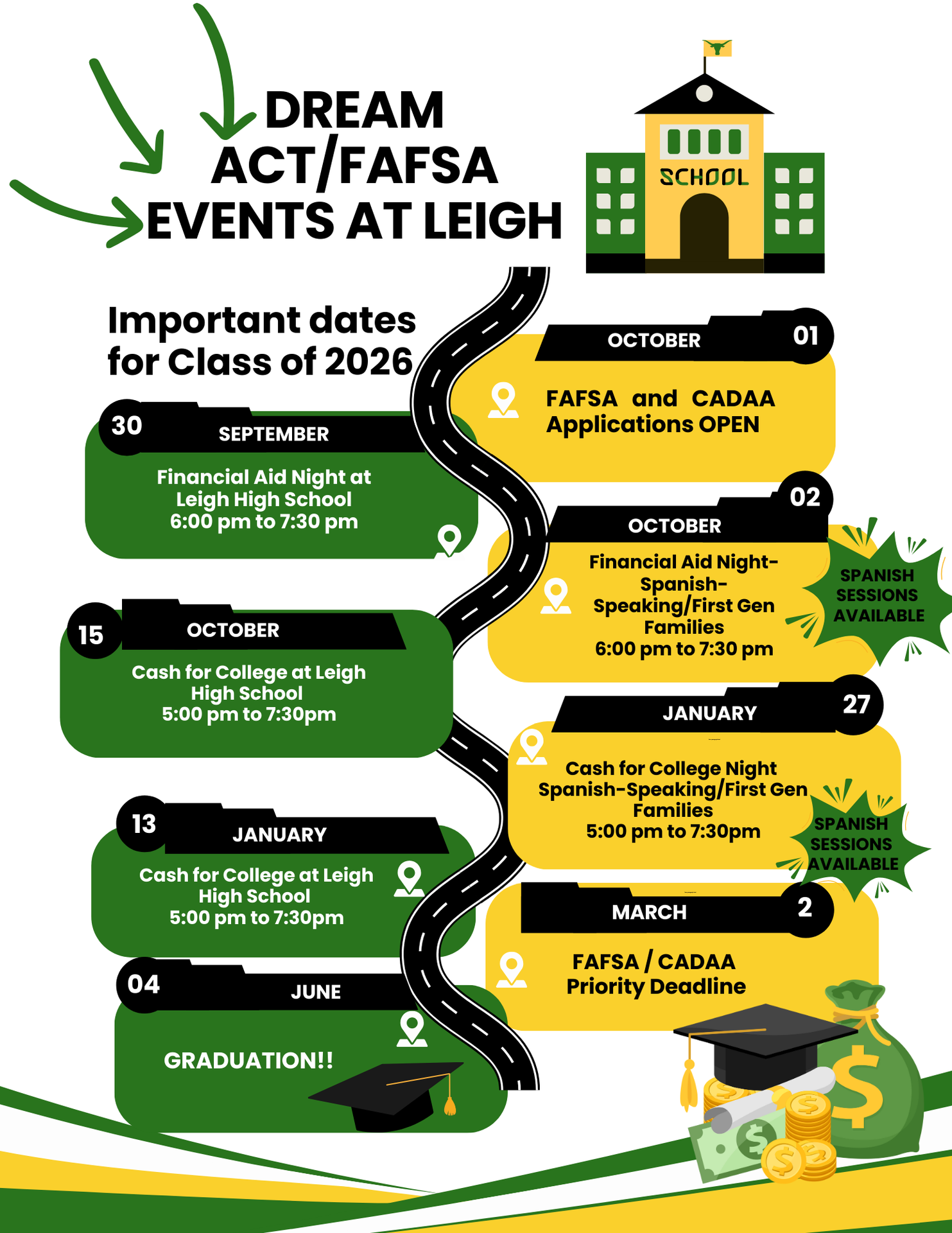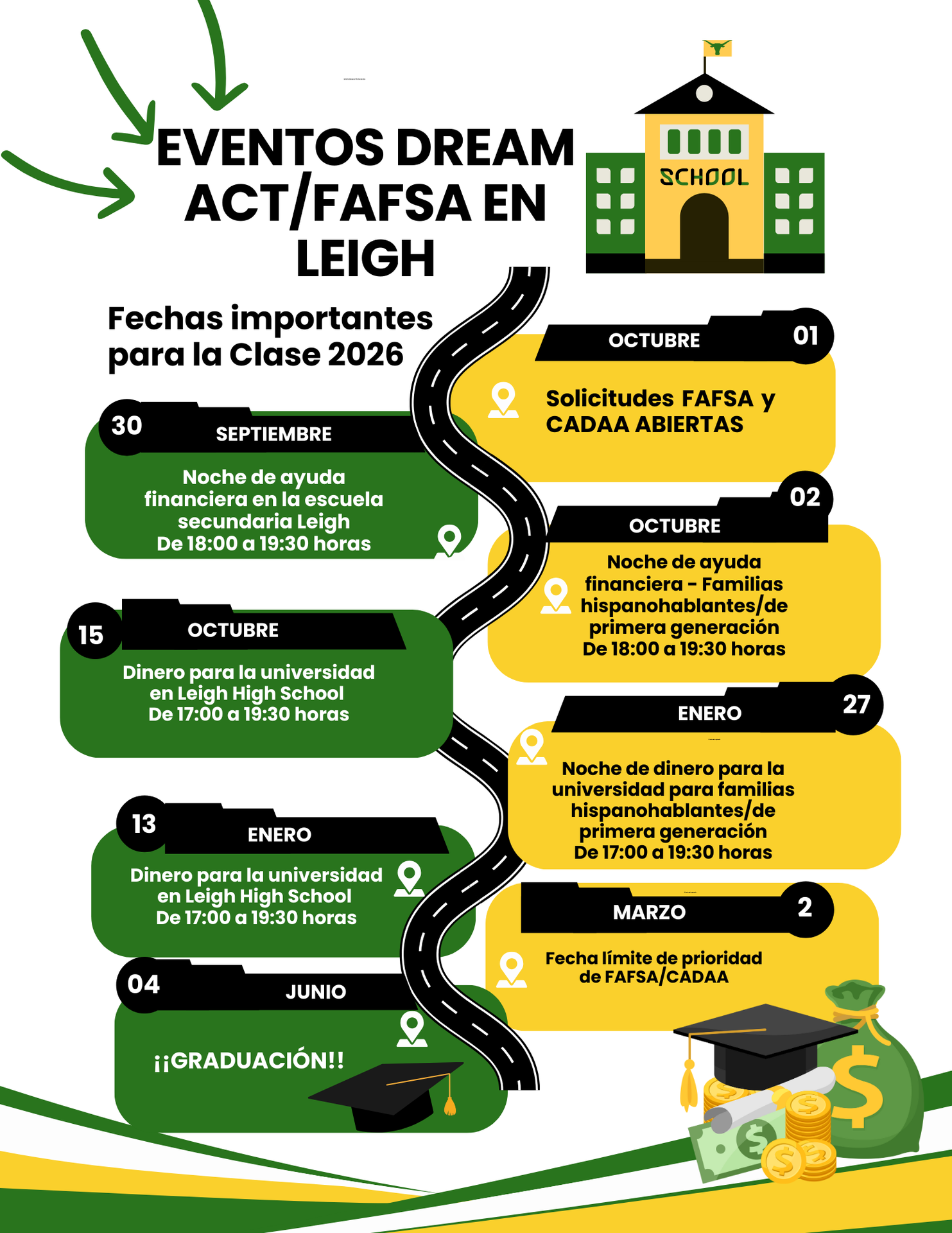Financial Aid & Scholarships
Scholarship Opportunities Available NOW!
There are many college scholarship opportunities available for students. For the most up-to-date information, students can view the scholarship list prepared by Mrs. Roumeliotis.
College Funding Options
There are four types of college funding available to students:
Federal Aid – Includes grants (doesn’t have to be repaid), low interest loans (to be repaid), and work-study (programs where students work to earn money to help pay for school). All students should apply for FAFSA in order to be considered for all of these types of federal and California state aid. Additional information on Federal Aid programs can be found here. After applying, students and colleges receive a Student Aid Report (SAR). Colleges match admission records with the FAFSA application info to determine aid eligibility for admitted students. Note that students who are non-citizens holding a Social Security card issued through Deferred Action for Childhood Arrivals (DACA) or some other work authorization should fill out the California Dream Act Application instead.
State Aid – Cal Grants are available for four-year colleges as well as for technical, vocational, or career education. The grant money does not need to be repaid and can be used at any UC, CSU, or qualifying independent and career/technical colleges in California. The process starts with the FAFSA and follows the same process with students receiving an additional California Aid Report (CAR). Students can create a WebGrants4Students account to view their Cal Grant status.
Scholarships/Aid from Colleges – Colleges often have their own resources for financial aid/scholarships (both need and merit based) that are specific to their campuses. Students need to visit the websites of colleges that they are considering for more information. Some colleges and scholarship programs (mostly private universities) require that a CS Profile is submitted. This requires a $25 fee and is much more detailed than the FAFSA application, so students should research whether the colleges that they are interested in require it. Students should apply for aid regardless of their financial circumstances - high cost private colleges may have more ability to assist students in various financial situations. The CS Profile application is found on the College Board website.
Scholarships from Non-Profit and Private Organizations – These can be merit/academic based and/or need based and typically are not subject to repayment although each scholarship has its own requirements. Naviance is updated weekly with scholarships that come in to Leigh directly - these are mainly local scholarship opportunities. Students can search in Naviance for these scholarships under the Colleges tab, Scholarships and Money section, Scholarship List or Scholarship Match. There is also a National Scholarship tool for students in Naviance under the same Scholarship and Money section. It provides info on scholarships nationwide and is run by Sallie Mae. There are other websites to help students search for scholarships nationwide, including https://www.scholarships.com and fastweb.com and http://www.finaid.org. There are many scholarship search resources available for free, so be careful about resources requiring a fee payment.
Free Application for Federal Student Aid (FAFSA)
The Free Application for Federal Student Aid (FAFSA) is required by both public and private universities and colleges before scholarships or financial aid is awarded. For more information about the FAFSA and instructions, the website is https://studentaid.gov/h/apply-for-aid/fafsa. Within a few days after filing online, you will receive a Student Aid Report (SAR) from the federal processor. It will list the student’s expected family contribution, or EFC. A standard formula is used to calculate the EFC, based on the information the student provides on the FAFSA. The SAR will also be sent to the colleges you indicated on the FAFSA. The colleges will use the EFC to determine if you will be offered grants, loans, and/or work-study program. The earlier you file a FAFSA, the more likely you are to hear from the Commission early. Since most colleges have a May 1 deadline for intention to register, it is to your advantage to know as soon as possible about financial aid so that you can make an informed decision regarding which college you will attend. You will fill the FAFSA out your senior year in high school.
Ultimately, all financial aid decisions are made by the individual college; therefore, it is necessary for you to work with the financial aid officer at each school to which you are applying. Also, be sure to apply on time.
To fill out the FAFSA you will need to know the following information:
- Your Social Security Number
- Your parents’ Social Security numbers
- Your driver’s license number if you have one
- Your Alien Registration number if you are not a U.S. citizen
- Your parents Federal tax information or tax returns including IRS W-2 information:
- IRS 1040, 1040A, 1040EZ
- Foreign tax return
- Tax return for Puerto Rico, Guam, American Samoa, the U.S. Virgin Islands, the Marshall Islands, the Federated States of Micronesia, or Palau
- Records of your untaxed income, such as child support received, interest income, and veterans noneducation benefits, for you, and for your parents if you are a dependent student
- Information on cash; savings and checking account balances; investments, including stocks and bonds and real estate (but not including the home in which you live); and business and farm assets for you, and for your parents if you are a dependent student.
Resources
- FAFSA Website
- Federal Student Aid Estimator - Early estimate of eligibility for financial aid
- Financial aid for mixed status families
CSS Profile
Many colleges, universities and private scholarship programs collect additional information to assist in the awarding of aid through non-federal financial aid programs. In particular, many private colleges require the CSS/PROFILE in addition to the FAFSA and some require that their own financial aid forms are submitted as well. If you are applying to one or more colleges on the CSS Code List (included in PROFILE registration material), you should complete both the FAFSA and PROFILE.
Please check with individual colleges for deadline dates.
WUE – Western Undergraduate Exchange
WUE is the Western Undergraduate Exchange, a program coordinated by the Western Interstate Commission for Higher Education (WICHE). Through WUE, students in Western states may enroll in participating two-year and four-year public college programs at a reduced tuition level - up to 150% of the institution’s regular resident tuition. WUE tuition is considerably less than nonresident tuition. (Source: wiche.edu/wue.)
For additional information, please visit www.wiche.edu/wue.


